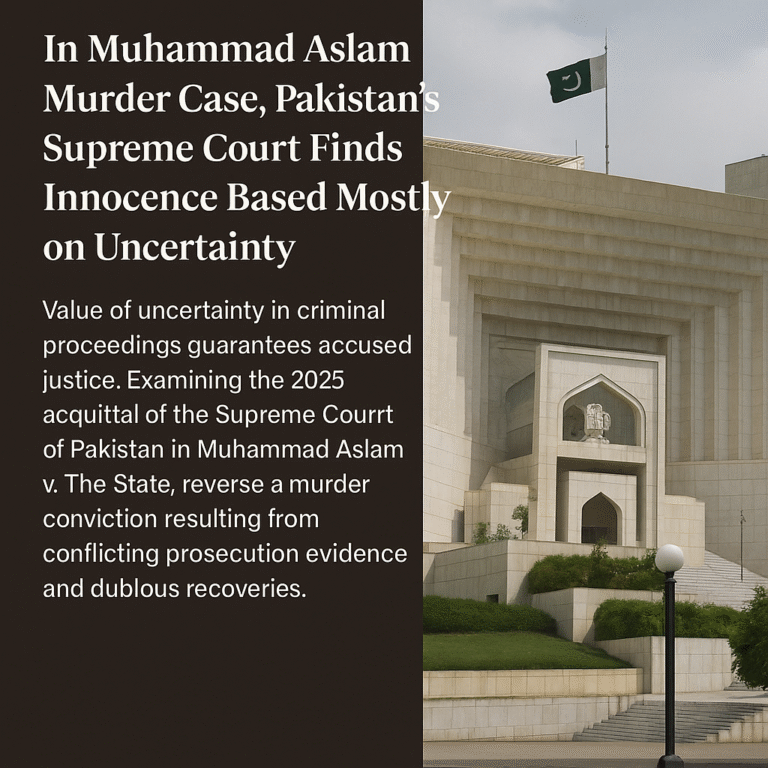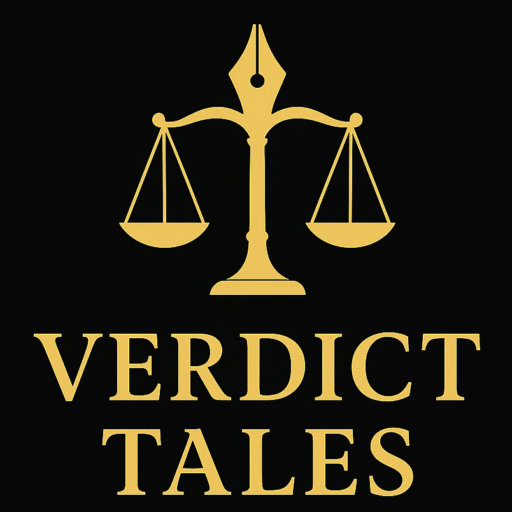Value of uncertainty in criminal proceedings guarantees accused justice. Examining the 2025 acquittal of the Supreme Court of Pakistan in Muhammad Aslam v. The State, reverse a murder conviction resulting from conflicting prosecution evidence and dubious recoveries.
Introduction to the Advantages of Uncertainty in Criminal Law ⚖�
Under criminal law, the idea that the accused is the “favorite child of the law” dictates that any uncertainty in the case of the prosecution has to be settled in the accused’s advantage. This guarantees justice by avoiding erroneous convictions grounded on dubious or contradicting proof. Under Section 302(b), the Pakistan Penal Code, 1860 (PPC), the Supreme Court of Pakistan utilized this theory in Muhammad Aslam v. The State (Criminal Appeal No. 77 of 2023), ruled on February 24, 2025, acquitting the appellant of murder charges under Section 302(b). Citing major contradictions in the prosecution’s evidence and dubious recoveries, the Court reversed concurrent convictions by the Trial Court and Lahore High Court. This blog looks at court rulings of the Court on criminal justice ([2023] CrL.A. 77, para 1).
Background of the Murder Case involving Muhammad Aslam 👆
Muhammad Afzal, the complainant, reported the death of his two sons, Ali Afzal (18) and Sajjad Afzal (15), at their Sahiwal, Punjab house on December 25, 2012. Crime report No. 840/2012 claims that the appellant, Muhammad Aslam, the nephew of the complainant’s wife, supposedly attacked the dead with an iron scissors and a wooden cricket bat, so damaging their skulls and rendering fatal injuries. Claiming to have seen the assault, the complainant and prosecution witnesses (PWs) claimed a motivation linked to family disagreements over property and past legal battles. Aslam was taken into custody on December 28, 2012; apparently, among other objects discovered were a blood-stained bat, scissors, and other tools. Aslam was found guilty by the Trial Court on January 5, 2015; he was sentenced to death on two charges and ordered Rs. 4,00,000 in reparation. On March 27, 2019, the Lahore High Court maintained the conviction; Aslam appealed to the Supreme Court (paras 2–4).
Case of the Prosecution and the Defense of the Appellant 📜
The prosecution made use of:
Statements from Muhammad Manwar (PW-2) and the complainant (PW-1) alleging they saw Aslam attack the dead with a cricket bat and scissors provide ocular evidence.
Medical Evidence: Reports following a death showing blunt weapon injuries.
Recoveries: allegedly seized from Aslam a blood-stained bat, scissors, and clothes; forensic tests confirmed human blood.
Denying the allegations, Aslam in his Section 342 Cr.P.C. statement claimed a fabricated case resulting from a vendetta. As Aslam had supported a criminal prosecution against the complainant’s wife, he claimed the dead were killed by an unidentified offender at night and the complainant linked him. He said the recoveries were fake and no independent witnesses were present (para 5).
The ruling of the Supreme Court: prolonging the advantages of uncertainty ⚖️
By granting Aslam the benefit of doubt, the Supreme Court, in a ruling written by Justice Irfan Saadat Khan, let his appeal on February 24, 2025, acquittal of him. The Court painstakingly reexamined the evidence, pointing up serious errors in the prosecution’s case.
Important Court rulings
Originally claiming Aslam used both a cricket bat and scissors, the complainant later denied mentioning scissors, therefore contradicting the criminal record (para 9). The deposition of PW-2 just described the bat, omitting scissors (para 9). These contradictions called into doubt the accuracy of the ocular account.
Conflicting with the complainant’s assertion of scissors-related injuries, the post-mortem reports verified injuries caused by a blunt weapon (para 9). The Court questioned the prosecution’s story by noting that the stated injuries—on the eyebrow and forehead—were improbable to have been brought on by scissors (para 9).
Unquestionably, the recovery of a blood-stained bat and scissors was dubious. Aslam’s arrest or the bat’s recovery from bushes had no public witnesses, and the police notebook has no record of blood-stained objects being recovered (para 11). Further undermining credibility was the investigating officer, Zain ul Abadeen, who had a record of dismissals and suspensions for unjustified searches (para 11).
Lack of Forensic Corroboration: The bat lacked fingerprint evidence attaching it to Aslam (para 5), although forensic examinations verified human blood on the seized objects and no DNA study linked the blood to the deceased. Recoveries, the Court decided, are just confirmatory and cannot support a conviction without credible substantive evidence (para 13, quoting Naveed Asghar v. The State, PLD 2021 SC).
Doubts and riddles in the prosecution’s case must, the Court underlined, benefit the accused, as decided in judgments like Muhammad Hassan v. The State (2024 SCMR 1427) and Tariq Parvez v. The State (1995 SCMR 1345). Enough doubt generated by the discrepancies, absence of independent witnesses, and dubious recoveries justified an acquittal (para 12).
Result
The Trial Court and High Court rulings were overturned by the Supreme Court, therefore clearing Aslam of all charges. Unless imprisoned for additional reasons, he was ordered released (para 14).
Judicial Ideas: Value of Doubt in Criminal Law 📚
Legally speaking, the foundation of criminal justice is doubt, which guarantees that convictions be based on data well beyond reasonable doubt. Important guidelines from the Muhammad Aslam case consist in:
Medical evidence and ocular testimony have to match exactly. Conflicting reports of the murder weapons highlight discrepancies that compromise the case of the prosecution (Muhammad Akram v. The State, 2009 SCMR 230).
Limitations in corroborative evidence: Recoveries, even with forensically support, are secondary to strong evidence. They cannot establish a conviction without DNA or fingerprint linking (Naveed Asghar v. The State, PLD 2021 SC 600).
Witnesses’ credibility: Testimonies from linked parties—such as the complainant and his allies—demand independent confirmation, particularly in light of medical evidence that runs counter to them (Muhammad Imran v. The State, 2020 SCMR 857).
Investigative integrity is of great importance for investigating agents. Like with Zain ul Abadeen, a history of misbehavior taints the accuracy of recoveries (para 11).
These values guarantee justice in criminal proceedings since they coincide with international norms, notably Article 14(2) of the ICCPR, which guarantees innocence. Like future application in tax law, the Muhammad Aslam case emphasizes that significant changes in evidence interpretation, such as those influencing guilt, must be applied carefully to safeguard the accused’s rights, so safeguarding.
Concerning Pakistani criminal justice 🌍
The ruling of the Supreme Court has great ramifications for the criminal justice system of Pakistan:
Strengthened Benefit of Doubt: Courts have to closely examine prosecution evidence and give acquittal top priority when questions remain.
Lack of DNA or fingerprint evidence emphasizes the need of sophisticated forensic skills to support prosecutions.
Officers with dubious records weaken case credibility, which calls for changes in police training and monitoring.
Protection Against False Implication: The decision promotes justice by safeguarding against convictions based on false implication or manufactured evidence or family grudges.
For more reading: Pakistani Criminal Justice.
Finish ☀
The acquittal of the Supreme Court in Muhammad Aslam v. The State in 2025 confirms once more that a basic protection in criminal law is doubt, therefore guaranteeing justice for the accused. The Court established a high benchmark for prosecution evidence by reversing a murder conviction because of conflicting testimony, contradicting medical evidence, and questionable recoveries. This decision represents a judicial benchmark for maintaining fairness in Pakistan’s criminal justice system.
Share Your Thoughts. How can the criminal justice system of Pakistan raise investigative integrity? Comment below and sign up for professional legal analysis subscriptions.
Key points:
Medical proof and contradicting visual testimony undercut the case of the prosecution.
Not able to maintain the conviction were doubtful recoveries, absent public witnesses and forensic links.
The Supreme Court granted Aslam of innocence by doubt, therefore relieving him of murder accusations.
The decision underlines strict evidence examination and investigation responsibility.




